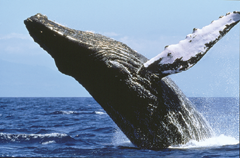
Majestic is an adjective often used by those lucky enough to spot a great whale in the wild. How else to describe a 40-tonne cetacean as it breaches the surface of the water in a seemingly gravity-defying feat? Well, splashy, for one.
Mister Splashy Pants was in fact the name given to one of 20 humpback whales currently being tracked by Greenpeace as they take a migratory journey from the warm South Pacific Ocean, where they breed, to the cold waters around Antarctica, where they feed.
Greenpeace put the christening of the whale to citizens in an online vote. Despite other more majestic names such as Aiko and Shanti, Mister Splashy Pants won the hearts of the vast majority of approximately 100,000 voters in December (even after an initially skewed total, the result of a click-happy hacker, was corrected).
The accompanying logo, a round, smiley blue whale character reminiscent of a bath toy with the words Mister Splashy Pants beneath, is being used to raise awareness about the Japanese Fisheries Agency practice of killing whales in the name of research.
Since the campaign began, the Japanese government has confirmed it will not kill any humpbacks this season, but Greenpeace maintains the fight isn't over to end whaling for good. "You named him, now save him," urges its website (and wear him -- Mister Splashy Pants t-shirts are also available for sale.)
Mister Splashy Pants attracted a lot of attention for Greenpeace's humpback campaign, and perhaps was the impetus for all the bad press that may have made the Japanese government change its mind.
Dolphin playmates?
Do endangered animals stand a better chance of survival if people think they're cute, if we anthropomorphize them to make them more pitiable? Or when Mister Splashy Pants' five minutes of fame are over, will his face, and fate, disappear in to the wild blue yonder?
In a poll of "top 10 things you must do before you die, the winner by a country mile was to swim with dolphins," reads the introduction to Whales & Dolphins of the North American Pacific from Harbour Publishing. (A photo essay from the book accompanies this article.)
And whales and dolphins are part of every type of folklore. Why? "They are beautiful, powerful, diverse, graceful and distinctive. Their intelligence and social bonds suggest a strong kinship, yet they inhabit a world that is as different from ours as we can imagine," writes Bernardo Alps, the president of the Los Angeles chapter of the American Cetacean Society, in the book's foreword. He suggests that different people and groups identify with different species.
Hungry killers
Here in B.C. orcas often take front and centre. There are inflatable and TV-based orcas at GM Place during Canucks' games, and the BC Lions society chose them for its highly visible, highly successful Vancouver-wide fundraiser "Orcas in the City."
Charming, aren't they? Except Lance Barrett-Leonard, head of the Vancouver aquarium's cetacean research program, reminds that orcas have been spotted eating "pretty much every animal in the ocean."
They're top predators and will prey on seabirds, seals, otters, sea lions and other species of whales -- even blue whales, which can reach up to 150 tonnes and are the largest animal on earth.
Which simply serves to remind that whales and dolphins, despite their size, intelligence and beloved status among most humans, don't live in a bubble. They exist in complex ocean ecosystems that are at risk from climate change, pollution and industrial fishing.
For example, people have been excited to spot large groups of Pacific white-sided dolphins in the Strait of Georgia in the past few years. This may seem like a good sign for dolphin-watchers and conservationists. However, Lance Barrett-Leonard says the species used to stay offshore, and researchers are puzzled about why they are moving closer and closer in.
"Whether it's due to good reasons, there's lots of food here, or bad reasons, like a loss of suitable habitat, we don't know," he says.
"Sightings coincided with the peak of the last international high seas flying squid industry. Many had nets spread out in deep waters in the North Pacific . . . it could have been [the dolphins] were tired of dying in nets."
Pity the plankton
As Dr. Daniel Pauly, marine biologist at UBC, has long pointed out, overfishing of the oceans has led to humans "eating down the food chain." The global appetite for sea food is threatening smaller sea creatures with little charisma going for them. Now even jellyfish are being scooped up to land on people's plates.
Perhaps a "Save the krill," or "Save the glass coral" campaign slogan isn't as catchy, but if Mister Splashy Pants and others are to survive, it's going to take a worldwide effort to protect all life that lies beneath, not just the cute creatures.
Related Tyee stories:
- Whale Killing War Games
Enviro groups slam Canada's sonar in naval mock-up. - Sardine Harvest a Threat to Mighty Humpbacks?
Alarms by BC scientists, tour operators don't convince DFO. - Consumers Alone Can't Save Our Fish
It'll take a boat load of votes, too.
Read more: Photo Essays
















Tyee Commenting Guidelines
Comments that violate guidelines risk being deleted, and violations may result in a temporary or permanent user ban. Maintain the spirit of good conversation to stay in the discussion.
*Please note The Tyee is not a forum for spreading misinformation about COVID-19, denying its existence or minimizing its risk to public health.
Do:
Do not: